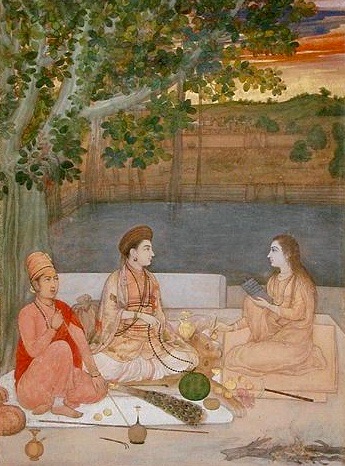|
Nath (other)
The Naths are a tradition within Hinduism. Nath may also refer to: * Nath (surname) (including a list of people with the name) * Nose-jewel, known as ''nath'' in some languages of India * Nath Bank, a former bank of British India * Sai Baba of Shirdi, Sai Nath, a popular guru from India See also * El Nath (other) * Nath Í (other), several Irish people with the name {{Disambiguation ... [...More Info...] [...Related Items...] OR: [Wikipedia] [Google] [Baidu] |
Nath
Nath, also called Natha, are a Shaiva sub-tradition within Hinduism in India and Nepal. A medieval movement, it combined ideas from Buddhism, Shaivism and Yoga traditions in India.Natha: Indian religious sect Encyclopedia Britannica (2007) The Naths have been a confederation of devotees who consider , as their first lord or , with varying lists of additional gurus. Of these, the 9th or 10th century |
Nath (surname)
Nath is an Indian surname, commonly found among Bengali Hindus and Assamese Hindus. 'Nath' community belongs to the Yogi-Nath group and are listed as Other Backward Class in West Bengal. Prior to independence, census statistics rarely included the caste name Nath. 19th-century British sources mentioned that castes known as jogis or jugis existed in Bengal, Punjab and Rajputana. The Naths, however, were one of the six subgroups of Jogi in the Rajasthan Hindi census. Some sources claim that Jogis held a low position during the 19th century. They appear to be particularly linked to failed ascetics and weavers who are often of lower status. In Assam, Yogi (nath) were historically known for drumming, now agriculture is their main occupation. In the state of Himachal Pradesh they are classified as Scheduled Caste under India's Reservation system. Notable people * Alka Nath (born 1950), Indian politician * Alok Nath (born 1956), Indian actor * Akshdeep Nath (born 1993), Indian crickete ... [...More Info...] [...Related Items...] OR: [Wikipedia] [Google] [Baidu] |
Nose-jewel
Most commonly associated since ancient Vedic times with Middle Eastern and Hindu women from the Indian subcontinent, these ornaments are attached through a piercing in the nostril. Nostril Ring Origins The Middle East is the birthplace of the nostril ring, with the first record of nostril piercings tracing back 4,000 years. In the book of Genesis, Abraham’s servant gifts young Rebekah an array of jewellery as a marriage offering on behalf of her future husband, Isaac. Among the gifts and trinkets was a golden earring called a “Shanf” also known as a nose ring. Hindu tradition The nose ring, called a Nath ( hi, नथ, ) in various Indian languages, is referenced in early Hindu Vedic texts and became popular around the 9th and 10th centuries becoming a symbol of a woman's marital status. The Nath in its full form - with a chain connected to a hairpiece or earring - is traditionally worn by a Hindu woman on her wedding day to honour and pay reverence to the Goddess, Pa ... [...More Info...] [...Related Items...] OR: [Wikipedia] [Google] [Baidu] |
Nath Bank
The Nath Bank ( bn, নাথ ব্যাংক) was an Indian-owned bank founded by Kshetra Nath Dalal in 1926 in Noakhali, now in Bangladesh but then in undivided India. By 1947, when the Partition of India was imminent, the bank had its head office and three branches in Noakhali district, and a branch in Comilla in Tipperah District. Noakhali and Tipperah districts became part of Pakistan, so the bank moved its head office to Kolkata Kolkata (, or , ; also known as Calcutta , the official name until 2001) is the capital of the Indian state of West Bengal, on the eastern bank of the Hooghly River west of the border with Bangladesh. It is the primary business, comme .... At that time, Indian banks were facing asevere crisis. In 1949, the Nath Bank had to be bailed out by the Reserve Bank of India. That failed to resolve the crisis and the bank was finally liquidated in 1950. The economist Arun Ghosh attributes its collapse to its over-aggressive expansion of branch ... [...More Info...] [...Related Items...] OR: [Wikipedia] [Google] [Baidu] |
Sai Baba Of Shirdi
Sai Baba of Shirdi (c. 1838? - died 15 October 1918), also known as Shirdi Sai Baba, was an Indian spiritual master and fakir, considered to be a saint, revered by both Hindu and Muslim devotees during and after his lifetime. According to accounts from his life, Sai Baba preached the importance of "realization of the self" and criticized "love towards perishable things". His teachings concentrate on a moral code of love, forgiveness, helping others, charity, contentment, inner peace, and devotion to God and Guru. He stressed the importance of surrender to the true ''Satguru'', who, having trodden the path to divine consciousness, can lead the disciple through the jungle of spiritual growth.Sri Sai Satcharitra Sai Baba condemned discrimination based on religion or caste. Whether he was a Muslim or a Hindu remains unclear, but the distinction was of no consequence to the man himself. His teachings combined elements of Hinduism and Islam: he gave the Hindu name ''Dwarakamayi'' ... [...More Info...] [...Related Items...] OR: [Wikipedia] [Google] [Baidu] |
El Nath (other)
El Nath or Al Nath, may refer to: * Alpha Arietis, a star * Beta Tauri, a star * El-Nath, a town in the popular MMORPG, MapleStory See also * * * * * Nath (other) The Naths are a tradition within Hinduism. Nath may also refer to: * Nath (surname) (including a list of people with the name) * Nose-jewel, known as ''nath'' in some languages of India * Nath Bank, a former bank of British India * Sai Baba of Shi ... {{dab ... [...More Info...] [...Related Items...] OR: [Wikipedia] [Google] [Baidu] |


